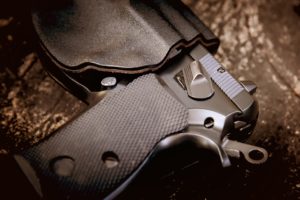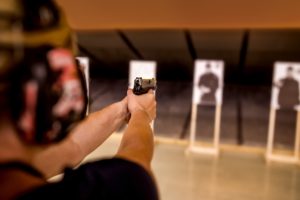The first thing to do is to purchase a gun that’s a good fit for you, that’s right for you. If you have not done so already, take an afternoon and stroll into a few gun shops in your area. See who you like and make that your gun shop. Then have them help you find the right gun for you.
Next, start practicing right away. If your gun shop has an indoor shooting range, start practicing there. We encourage someone who is new to practice at least once a week.
You can do dry fires in your home when you have time, but you should hit the range as much as you can. At a minimum, go every very couple of weeks. Going every week is better, if you can. It all depends on your schedule and your means.
It can be fairly expensive to go to a range, with ammo and targets and range time. Dry firing is something you can do at home for free. You don’t have to buy bullets, you don’t have to pay for range time, these are something you can control as far as cost. Just know that dry firing over time can damage a firearm. So find a balance between dry firing and shooting live rounds at the range.
As far as practice goes, it’s not like riding a bike. You can’t just get back on. Shooting is a skill, and like all skills you must practice to keep your skills sharp.
There are fundamentals to shooting and it’s not as easy as it looks. Anyone can pick up a gun and shoot it, but if you pick up a gun and you’re shooting an intended target to save your life, or someone else’s life, you have to be accountable for each round you shoot. This is why honing your skills is very important.
If you live in an apartment, and something happens in the middle of the night, you don’t want your rounds blasting through walls or doors of your neighbors. You have to be accountable for your rounds.
So when you are practicing, just don’t go out there and shoot a bunch of rounds and think “Oh this is fun, bang, bang, bang.” Make yourself think, “Hey, there are certain drills I can do here. Choose specific drills that your gun shop recommends.
Make sure you’re being accountable for each round and not just going off and shooting just to be shooting. It’s a skill, respect it, practice and your skills and confidence will grow the more you practice.
If you know how to shoot and want to carry but you are still concerned, here are your next steps to get more comfortable and more confident.
Become a life-long student of firearms. That means constantly educating yourself. Christy Painchaud will tell you she is still learning, and she is a retired professional. The second you think you know everything, you’re going to get yourself or someone else hurt.
Continually practicing and learning and reading is the way to go. Know all your state and local laws. Make sure you’re not going to get yourself in trouble, like carrying your gun somewhere that you shouldn’t be carrying. Practice, again, making sure you’re continually honing your skills.

If you choose to carry concealed every day, don’t have it on you “just because” where you’re thinking… “check got that” and checking boxes. It’s about respecting the firearm and training with it responsibly. Being responsible, so if you’re going to carry a firearm, you need to do everything that goes along with it.
Educate yourself with qualified, vetted training and content, like you get here at E3 Firearms Association, or any other responsible company that has great vetted content.
A lot of people think they are the only ones having thoughts like “I’m not confident.” But you know what, everybody has had those thoughts.
The more you get into communities like E3 Firearms Association or other great sources, and hear from other people, you will find out, you’re not the only one that thinks that. You’re not the only one that goes through these same emotions. Knowing this makes the journey a little bit easier.
Christy Painchaud, one of our E3 Firearms Association contributors and a retired federal agent, special agent and criminal investigator shared a story about this. She once went off with one of her former co-workers in a different career field to go shooting. Her friend was a reserve agent in training, a certified police officer, so she was practicing, and her and Christy went off to the range for a girl’s day out.
Christy took her to the range and her friend hadn’t shot. The only time she shot was when she was in training. Christy looked over and saw her friend was loading her magazine and putting the bullets in wrong. and it’s like, it would have been easy just to laugh at her.
But Christy’s friend was nervous and intimidated to be in that environment. She had not been practicing enough, and made Christy was think… “This is someone who is a certified police officer?”
They laughed about it, but something as simple as that is what Christy sees recruits doing all the time in classes. There are certain ways you load magazines, bullets go certain ways. I can’t tell you how many students put their bullets in the wrong way in a magazine and then try to load it.
This is just an example of why you need to get to the range and practice. Make sure you know what you’re doing and you’re educating yourself on how to properly operate the firearm, don’t just guess.
Remember, there are no dumb questions. You have to just ask questions, while asking a qualified person. We’re all just humans so don’t feel bad or stupid. We’ve all done stupid stuff. We just have to be safe and learn from our mistakes. The best way to do this is to practice at a gun range regularly.
How did this post help you? Do you have a better idea of what to do now that you have your CCW license? Do you see that professionals in training often make mistakes too. We are all human, so don’t get down on yourself. Does this post make you want to go out and hit the range weekly? Share your thoughts below.
